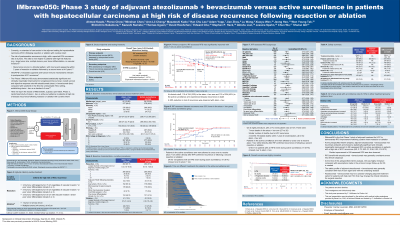Hepatocellular Carcinoma
(13) IMbrave050: Phase 3 study of adjuvant atezolizumab + bevacizumab vs surveillance in hepatocellular carcinoma patients
Saturday, September 23, 2023
6:00 PM - 7:30 PM East Coast USA Time

Edward Cha, PhD – Medical Director, Genentech, Inc; Minshan Chen, MD, PhD – Director, Liver Surgery, Sun Yat-sen University Cancer Center; Ann-Lii Cheng, MD, PhD – Director, NTU Cancer Center of National Taiwan University; Pierce Chow, MBBS, MMed, FRCS, FAMS, PhD – Director, Duke-NUS Medical School; Stephen Hack, MBChB – Senior Medical Director, Genentech, Inc; Jeong Heo, MD, PhD – Professor, Pusan National University; David Hsieh, MD – Assistant Professor, UT Southwestern Medical Center; Masatoshi Kudo, MD, PhD – Professor and Chairman, Kindai University Faculty of Medicine; Han Chu Lee, MD, PhD – Professor, Asan Medical Center, University of Ulsan College of Medicine; Qinshu Lian, PhD – Principal Data Scientist, Genentech, Inc; Shinichiro Nakamura, MD, PhD – Associate Professor, Nagoya University; Kazushi Numata, MD – Clinical Professor, Yokohama City University; Shukui Qin, MD, PhD – Professor, Cancer Center of Jinling Hospital, Nanjing University of Chinese Medicine; Jessica Spahn, PhD – Senior Clinical Scientist, Genentech, Inc; Won Young Tak, MD, PhD – Professor, Kyunopook National University School of Medicine; Thomas Uguen, MD – Doctor, Rennes University Hospital Center; Lu Wang, MD, PhD – Professor, Fudan University Shanghai Cancer Center; Xiaoyu Wen, MD, PhD – Professor, First Hospital of Jilin University; Chun Wu, PharmD – Senior Safety Director, F. Hoffman La-Roche Ltd; Adam Yopp, MD – Associate Professor and Division Chief, UT Southwestern Medical Center; Jian Zhou, MD, PhD – Professor, Zhongshan Hospital, Fudan University, Shanghai
Purpose: The risk of HCC recurrence after liver resection or ablation with curative intent is 70-80% within 5 years, indicating an unmet need for effective adjuvant therapies. Atezolizumab with bevacizumab is the standard of care for unresectable HCC based on the IMbrave150 study (Finn NEJM 2020, Cheng J Hepatol 2022). On the basis of the antitumor activity of atezo + bev and its capacity to modulate the tumor microenvironment, IMbrave050 was designed to evaluate the efficacy of adjuvant atezo + bev in delaying or preventing recurrence in patients with high-risk HCC.
Material and Methods: IMbrave050 (NCT04102098) enrolled pts with HCC at high risk of recurrence following resection or ablation. High-risk criteria were based on tumor burden, vascular invasion, and tumor differentiation. Pts were randomized to Arm A (atezo + bev) or Arm B (active surveillance). Stratification factors included geographic region and a composite factor encompassing the number of high-risk features, curative procedure, and use of optional adjuvant TACE (allowed for one cycle following resection). Pts in Arm A received atezo 1200mg + bev 15mg/kg IV q3w for a period of one year or 17 cycles. Pts in Arm B underwent active surveillance for one year and were eligible to crossover to atezo + bev following independent review facility confirmation of recurrence. The primary endpoint was IRF-assessed recurrence-free survival. Secondary efficacy endpoints included OS; investigator-assessed RFS; and time to extrahepatic spread and/or macrovascular invasion.
Results: The ITT population included 334 pts each in Arms A and B. Baseline demographics were balanced between arms. At interim analysis, with a median follow-up of 17.4 mo (cut off date: Oct 21 2022), the primary endpoint was met with an IRF-RFS HR of 0.72 (95% CI, 0.56, 0.93; P=0.0120). INV-RFS was similar (HR, 0.70; 95% CI, 0.54, 0.91). The safety of atezo + bev was consistent with the well-established safety profile of each therapeutic agent and with the underlying disease.
Conclusions: Atezo + bev is the first adjuvant regimen to demonstrate a statistically significant and clinically meaningful improvement in RFS vs active surveillance in pts at high risk of disease recurrence following resection or ablation. The benefit:risk profile of atezo + bev favors the use of this regimen as an adjuvant therapy and has potential to set a new standard of care in adjuvant HCC.
Material and Methods: IMbrave050 (NCT04102098) enrolled pts with HCC at high risk of recurrence following resection or ablation. High-risk criteria were based on tumor burden, vascular invasion, and tumor differentiation. Pts were randomized to Arm A (atezo + bev) or Arm B (active surveillance). Stratification factors included geographic region and a composite factor encompassing the number of high-risk features, curative procedure, and use of optional adjuvant TACE (allowed for one cycle following resection). Pts in Arm A received atezo 1200mg + bev 15mg/kg IV q3w for a period of one year or 17 cycles. Pts in Arm B underwent active surveillance for one year and were eligible to crossover to atezo + bev following independent review facility confirmation of recurrence. The primary endpoint was IRF-assessed recurrence-free survival. Secondary efficacy endpoints included OS; investigator-assessed RFS; and time to extrahepatic spread and/or macrovascular invasion.
Results: The ITT population included 334 pts each in Arms A and B. Baseline demographics were balanced between arms. At interim analysis, with a median follow-up of 17.4 mo (cut off date: Oct 21 2022), the primary endpoint was met with an IRF-RFS HR of 0.72 (95% CI, 0.56, 0.93; P=0.0120). INV-RFS was similar (HR, 0.70; 95% CI, 0.54, 0.91). The safety of atezo + bev was consistent with the well-established safety profile of each therapeutic agent and with the underlying disease.
Conclusions: Atezo + bev is the first adjuvant regimen to demonstrate a statistically significant and clinically meaningful improvement in RFS vs active surveillance in pts at high risk of disease recurrence following resection or ablation. The benefit:risk profile of atezo + bev favors the use of this regimen as an adjuvant therapy and has potential to set a new standard of care in adjuvant HCC.
